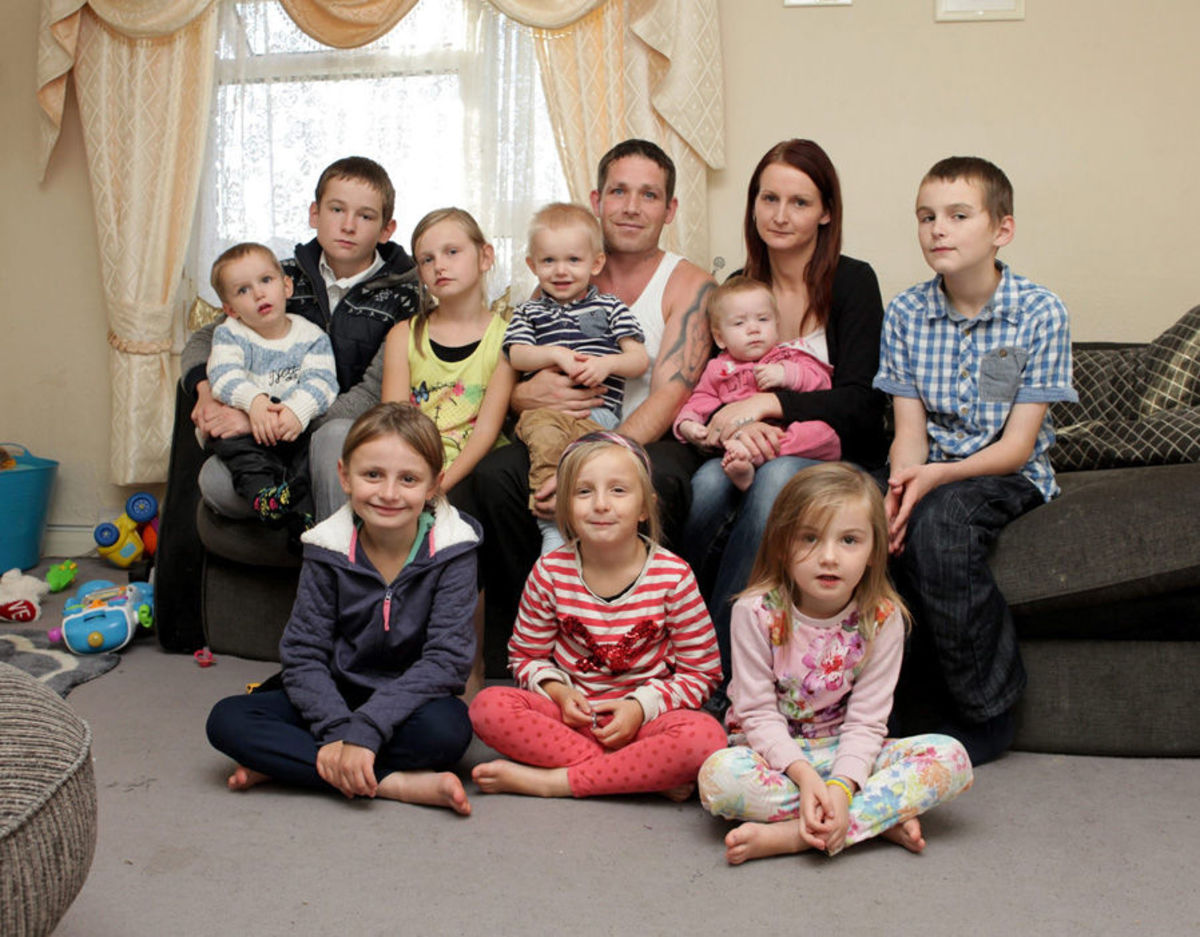What is the root cause of poverty in the world?
What creates greed then? I would say that the capitalist economy that revolves around profit and cyclic consumption. If I deposit $1,000,000 into a CD at %4 interest i would garner $40,000 every year in interest. That %4 has to be paid by someone and that someone is the middle class person paying %200 of the cost for ther home back to the bank through compound interest. So i would say that greed starts with the bankers who make money of the work of others. Get rid of money and return to a community and resource based way of life.
I agree. Greed starts with the criminal banking system, a system which is kept alive by manipulation.
Large/very large families of six & more children. Elimination of large/very large families & the practice of birth control will reduce, if not eliminate, poverty!
GM, How do you think controlling the size of families is going to go over with liberals who seem all about liberties in every other aspect of life ? I agree with your thoughts to an extent but poverty has more to do with intelligence of heads of families dosen't it ?
If that were true we wouldn't have homeless single people and couples. Small families wouldn't get food stamps or free school lunches.
This is a very interesting question and horse is correct, it's different in different parts of the world. China has tried to control family size and that hasn't prevented poverty. However, it does sort of point to the problem.
Overpopulation has to be one cause.
The other cause is the population relative to the ability of a place to support that population.
I think it's fair to say that if you live in a place or a situation that cannot support additional people, you should not produce additional people. Unfortunately, our world believes that it's every human being's right to procreate and so rarely do you hear anyone speaking out against procreation.
Greed definitely has a role in poverty. So does religion. Religion is against birth control, for the most part, and encourages procreation in very poor parts of the world.Poverty is a mindset & consciousness in America. Poor people are passive & negative. They imbue their children in their toxic, negative philosophy. Poor people glorify being poor. They are suspicious of anything outside their socioeconomic purview. They see wealth & socioeconomic affluence as anathemas. They live in the immediate & believe in instant gratification.
Large/very large families have the culture of poverty if one observes them. They believe in living in a substandard way. They see nothing w/living at the bare rudimentary level, if that. They accept that they are lacking in the midst of plenty. They consume inferior food, wear inferior clothing, & living on top of each other on a primitive level(I am talking about America). Large/very large families teach their children not to aspire & be happy w/the minimum. Such children aren't taught culture nor civilization. When I see poverty, I see large/very large families. Small families are seldom, if ever, poor. Small families mostly are middle class or better while large/very large families are poor to impoverished.
Large/very large families are impoverished. The average large/very large family depend upon OUTSIDE donations to stay socioeconomically afloat. Parents of large/very large families are less intelligent & educated than parents of small families who are highly intelligent & educated. Poor people have a FAR DIFFERENT perspective on life than middle class people pure & simple!
Poor people are socioeconomic D-F students. They really don't get the socioeconomic game. They LOVE & ARE HAPPY being poor. In fact, they REVEL in & GLORIFY being poor. It is analogous to the D-F student who brags that school is lame. Poor people DON'T want to better themselves at all!GM , I hate to open a can of worms but you definitely have a bias against the actual people of poverty , There is a myriad of reasons for familial poverty GM , respectfully , I think you have some sort of fetish against large families however .
Not related at all to family size is disease , cancer can decimate the finances of any family , so can simple geographics , what about regional economic collapse ? To be very fair you have to consider so many probables or possibilities in reasoning . You are making far too many generalities and are beginning to sound a bit like me !.........;-]Not biased at all. I am just being truthful about negative, toxic, & aberrant conditions. Poverty means no choice, not to mention a hellish, animal-like, primitive existence. Large/very large families mean the same thing. If I had my way, everyone would be at THE MINIMUM middle class & not have more than 2 children. I am a staunch believer in family planning.
Children in large/very large families are exposed to pathologies which influence their formative & later behavior mechanisms. They are academically & intellectually behind because there is no mental/intellectual stimulation in the home environment. They are uncultured because they aren't exposed to cultural activities. They subsist at a barely rudimentary level while other children exist at a comfortable level. They have to depend on outside assistance to keep them socioeconomically afloat.
Girls from large/very large families are exposed to continual pregnancies that many become pregnant in their teens. After all, pregnancy is normative in the large/very large family environment. Girls in large/very large families aren't taught the value of education & independence, not to mention improving themselves. They are pushed to become pregnant at a very early age. Like poor girls are pushed to become pregnant early because that is all what is in the environment.There is a systemic element to poverty that you are ignoring here. There is a cultural element to poverty.
Where poverty is concerned, we are always battling between the systemic elements and the personal responsibility elements, but the two are intertwined.
I will try to bring in politics without offending, but liberals tend to lean toward the systemic reasoning and conservatives prefer the personal responsibility reasoning.
They are both reasons and they are intertwined. Ultimately, the explanation is a complex one. Yes, the system is to blame, but many times the people are to blame as well.
That said, it is much harder to rise out of poverty than it is to sink into poverty. In other words, we see far more people in poverty stay in poverty than we do those in the middle class or upper class sink into poverty.
I don't have a solution. It just would be nice, at least, if everyone admitted it was a complex problem that requires a complex solution. If you simply blame those who are poor and wash your hands of the issue, nothing will ever change.In the United States, many poor people want to be poor. They act irresponsibly. They believe in living for the moment. They have a passive attitude towards life & circumstances. They act impulsively & aren't concerned about the future ramifications of their actions. Poor people in America have no one to blame for their impoverished status except themselves.
I have seen poor/lower income people & they are content w/their situation. If they weren't content, they wouldn't be poor. They are against anything that would elevate them educationally, economically, & financially. They complain about the wealthy yet want others to constantly GIVE them. The poor are a parasitic class. Our tax dollars are going to support such people- ENOUGH is ENOUGH!
People in the United States don't have to be poor if they don't want to. All they have to do is to plan & organize longterm. They also have to value education, cultivation, & anything outside of a primitive existence. They also have to learn to curtail their instincts. Lastly, they have to learn about family planning, birth control, & smaller families. As I have reiterated, large/very large families are THE ROOT of poverty. The larger the family, the poorer the family is. Cut out large/very large families & the poverty rate would be drastically reduced. What I am presenting is common sense. The poor only have THEMSELVES to blame for their impoverishment, no one else!
GM , you write like lower intelligence is a choice yet I agree with the individual accountability and those content with poverty , but what about those content with even 1-2 children , much wealth and their inevitable immorality , lack of integrity and a penchant for crime ; it really matters rather little about family size as to the scale of negative social and cultural attributes.
There are pathologies & aberrations in large/very large families(6-more children per household w/married parents) that aren't present in small families(1-2 children per household w/married parents). The large/very large family environment is totally inverse of the small family environment. Parents of large/very large families are for the most part infantile & irresponsible. They have children aimlessly, not being concerned about the future emotional, educational, psychological, & socioeconomic well-being of their children. Their attitude is well $%^ if they make it, okay & if they don't well...…….. Children in such families are bereft of parental affection & care. For the most part, they must raise themselves & each other.
The large/very large family atmosphere is one of impoverishment or even penury. It is commonplace for large/very large families to depend upon outside assistance to be socioeconomically afloat. The average large/very large family depends on charities, the government, or more affluent relatives to keep them subsisting. Many children in large/very large families go w/o even the rudiments unlike children from small families who have a comfortable lifestyle.
There is intense rivalry & competition in large/very large families. There is infinitely more negative social & cultural attributes in large/very large families than there is in small & even medium families(3-4 children per household w/married parents). Children have to learn to NAVIGATE their environment early. In such families, there is the rule of the jungle-the strong dominate/survive while the weak fall through the familial cracks. Children from large/very large families become harsh, unfeeling, & content w/poverty as a result of their environment. Cut out large/very large families & you will cut out poverty pure & simple.
Let me add that there are high instances of abuse & neglect in large/very large families. For example, the Turpin family where the children were starved because the parents couldn't afford to support them. Abuse/neglect are a dime a dozen occurrence in the large/very large family environment.
There is a high correlation between large/very large families & socioeconomic poverty. There are also high correlations such as abuse & neglect. In large/very large families, harsher punishments are used to discipline children. There is a correlation between educational levels & family size. The lower the educational level, the larger the family. Less educated people have the LARGEST families while highly educated people have the SMALLEST families.
While I agree with some of your points, the overall assessment of how easy it is for poor people to move up socioeconomically is simplistic and just flat out wrong.
Again, it's a complex issue and saying they just have to do a little planning is ridiculous and downright insulting. The number of systemic issues making it harder for poor people to move up socioeconomically is staggering.
Strangely to me, Horse hit on an important point that's difficult to talk about, probably due to political correctness, but stupid people make stupid choices. Stupidity breeds poverty. Some people are poor for entirely different reasons, but it would be interesting to see a study that could identify the number of poor people who remain so because they just don't possess the intelligence to make their way out of poverty since education is a key element in moving up.
I completely agree that family size is a factor. If you're poor, having 12 kids makes it that much more difficult that you or any of them are ever going to move up in the world.
So what is the role of government in all this? Conservatives have it right in that the government cannot be in the business of giving incentives for more children, which inevitably makes things worse. The government should have a role, but that role should be in creating paths for people to get out of poverty, not stay in it."...but it would be interesting to see a study that could identify the number of poor people who remain so because they just don't possess the intelligence to make their way out of poverty..."
An interesting study indeed, if it ignored PC and was honest. I would add, however, that it isn't just intelligence but that incentive plays an even bigger role. And that we not only provide no incentive we provide incentive NOT to improve. I really believe (belief only without factual information) that the vast majority of people are intelligent enough to rise out of poverty...there just isn't sufficient incentive to do so. It's hard for me to accept that half my neighbors and friends are incapable - whether from physical disability or mental deficiency - to support themselves AND contribute to the needs of the country.Again, it's complex.
I would absolutely agree that providing incentive not to work or get an education is a huge mistake. We'd be better off paying people to graduate high school than giving them welfare if welfare is actually working against the best interests of people and the country.
Also, we should not be incentivizing people to have more children.
We should have a social safety net, but it is a precarious thing if not run well.
And I don't mean literally handing somebody a check for graduating high school (though if that worked, imagine the impact on the country and people's lives), but perhaps a low-cost or no-cost loan to attend college or something like that.Between grants, scholarships and existing low cost loans for college anyone that truly wants to go can do so.
Problem is that if we "pay" people to get educated we end up with a mass of people with college degrees that are worthless in the workplace - the effort is not to get salable skills but simply to get the "payment" and the price is to sit in a classroom. "Scholar" does not produce the income that "bricklayer", "engineer" or even "scientist" does.
Until people are convinced that they either work or go hungry education isn't going to do a whole lot. Until there is actually something to be gained from that education - an obvious and large improvement in lifestyle rather than shifting the burden from the taxpayer to the individual - we won't see much improvement.College isn't actually the answer. Too many people in college already. We need more trade skills (as I think you are suggesting).
I'm not saying we pay everyone, but there's a way to do it where that money is paid back and it's not a burden on the taxpayer.
And it's hard to work when you have to stay home to take care of your children because your spouse left or you were never married in the first place. It's very tricky, but people who are poor cannot be incentivized to stay home and have children. I don't see any calculus where that works out.
Also, we need a lot more analysis on the working poor and what prevents them from earning more.Poverty is a culture & mindset. The average poor person, working & non-working are content to be where they are socioeconomically & educationally. They may complain about their lot in life but refuse to do anything to improve their situation. For example, my oldest maternal aunt. She was the 3rd of 10 children. She got pregnant as a teen & had to take a dead end job. My father suggested that she should work for the post office but she refused to do so. She HATED her dead end job & took out her misery upon others. No one told her to remain where she was- she CHOSE to be where she was. She took out her frustrations on her employer & her children(she was a maid). There was opportunity for her to continue her education but she would rather complain than to improve herself. People have CHOICES as of whether they want to IMPROVE themselves or STAGNATE-it is up to THEM, not society nor the system.
Poor people LOVE their aberrant lifestyle. They may suffer & do without but subconsciously they LOVE/DESIRE being poor. If such wasn't the case, they would elect to remain in poverty. They also act irresponsibly by bringing children in the world when they can't afford to do so. Everything is CHOICE & by FREE WILL. If one doesn't want to be poor, one doesn't have to be. There are so many opportunities in America not to be ……….poor.You can't just pin a psychological profile on an entire group of people based on their socioeconomic status.
Is choosing to be poor like choosing to be fat? I think you can stop being fat by not eating so much and exercising more. Is not being poor that easy?
If you're born into poverty, getting out can't be that easy. You're undoubtedly limited in many aspects of life, particularly opportunity. While many people can and do get out of poverty, the reasons others do not is as varied as the reasons for any other socioeconomic condition.
It's the same attribution people make about women who are victims of abuse. It seems so easy, just leave. Turns out it's not that easy.
What shouldn't be that hard is having compassion for those who are genuinely interested in bettering themselves who happen to be starting out in a bad place.
Saying that every poor person wants to be poor is inaccurate and leads to cruelty. But neither should we provide aid endlessly for those who don't want to improve themselves.
People feel trapped for a wide variety of reasons.You are correct; we already have more college grads than we can use. Although an unacceptably high percentage are in fields without earnings potential, IMO.
It is HIGHLY POSSIBLE for people to get out of socioeconomic poverty in America if they WANTED to. Sadly, the average poor person would rather complain about their hellishly dire situation than to do anything concrete to improve their situation. They would rather watch tv & dream about a better life than to make the necessary sacrifices to become socioeconomically affluent. I have to concur w/Wilderness' analysis. People would rather find excuses than.....DO anything to improve themselves. I find this sad.
Agreed, with some exceptions for physical/mental disabilities. There are people incapable of supporting themselves, but they are a minority. And there are more whose poor choices have made it quite difficult but still possible with sacrifice and hard work.
Which points out that it isn't a matter of having 3 or 4 kids that drives poverty.On the last part, disagree. The more children, the higher incidence of poverty while the less children, the less incidence of poverty. It is the poor who have the largest families. Cut out large families & one cuts out poverty. If one doesn't want poverty, plan & strategize your educational & socioeconomic goals. Don't engage in unintelligent behavior. Don't have children until educationally & socioeconomically established & have SMALL families.
I completely agree with family size. If you're poor, you shouldn't be having children.
That said, where is any data backing up the assertion that poor people want to be poor? This is strictly an opinion rooted in your own experiences."Cut out large families & one cuts out poverty."
If that were true we wouldn't see single homeless people/couples. We wouldn't have 4 person families living on food stamps and subsidized housing.
On the other hand if you eliminate poverty I do think you would eliminate a large percentage of 6+ person families. It's a matter of which comes first, and poverty breeds large families.
- ahorsebackposted 7 years ago
0
Otherwise the "root cause " has to be looked at from a regional standpoint . Poverty in say Uganda is far , far different than poverty in Baltimore Md. for instance .
Follow the money and find out who benefits from proverty?
- ahorsebackposted 7 years ago
0
GM, at present in a 2.6 kid family ,- 56% of college attendees finish their degrees -and lowering % , While only 80- 85 % of high schoolers graduate[real polls show 70 %]. only 62 % of college grads are employed using their diplomas , Not very positive issues to justify controlling the size of a family ?
Look at blue / while collar crime rates , the lacking of family values today , illicit drug use , credit card debts , national debt , -50 % election participation , abortion rates , family planning , addictions to prescription drugs , the simple fact that we are suffering an incredible lack and a decline of family moral values TODAY at the 2.6 kid level ...............Maybe we need the larger families of yesterday ---and a return TO more integrity and morality? In general American population is moving in the right direction, stil just not healthy for the natural environment. Since the 50s families lived in 1/3 the house space and had three times the members of the family.
Economic policy for the most part is still biased against the poor — in some ways, it is becoming increasingly antipoor.
The war against the poor may be most pronounced in the U.S. Washington sliced $8.7 billion from the food-stamp program in February, even though nearly 47 million people, or about 1 out of every 7 Americans, currently rely on it. A new bill to extend emergency unemployment benefits is almost definitely dead on arrival in the Republican-controlled House of Representatives.
The standard conservative argument against such welfare programs is that they make people dependent on “nanny states” and discourage initiative. But statistics say otherwise. According to the Center on Budget and Policy Priorities, more than 60% of families with children who receive food stamps have a member who works. Food and housing is by far your largest expense.
That is I build tiny houses that 90℅ of people can afford and teach farming in your yard.Again people, the ROOT cause of poverty in the world are large & very large families of 6 children & more. Look at any impoverished nation in the world or impoverished neighborhood in the United States, one will see large to very large families. There is a very high correlation between large/very large families & poverty, adding the pathologies & aberrant behaviors which go with large/very large families & poverty such as delinquent behavior, illegitimate pregnancies, school drop out rates, etc. The large/very large family is a cesspool of negative, toxic behaviors which AREN'T found in smaller families of 1-4 children. Look at the affluent nation & one will find a preponderance of small families. It doesn't take a rocket scientist to surmise that large/very large families equal poverty while small families equal affluence. Do the math!
Still liked the not so long ago law of one child born in China.
Nothing's wrong w/1-child families. In fact, the only child population is rising. 1-child families don't have the stress of multichild families emotionally, educationally, finanacially, & psychologically. 1- child families are QUITE BENEIFICAL for parents & children alike. There is no sibling drama in 1-child families. Children in 1-child families receive attention & love from parents. There is monies to live life beyond the daily hellish struggling rudiments which are present in multichild families.
1-child families are stress-free & beautiful which explains the reason why those from multichild, particularly large/very large families, hate small, particularly 1-child families. 1- child families are beautiful, cultivated, & civilized. Thank you Castlepaloma, we are on the SAME PLANE.The only way to reduce poverty particularly world wide is to educate women. The higher the level of education, the more opportunities women will have. With such opportunities, there will be wider interests. With wider interests, there will be MORE options & w/such options, there will be FEWER children.
Women who have large/very large families have FEW/NO options. Because of these things, these women have no options but to have children & LOTS of them. Same as women who have large/very large families in America. They are among the uneducated/less educated w/fewer options. Since they have little or no outside interests, they indulge in sex & have child after child after child ad infinitum.
Educated women know the benefits of family planning. Uneducated/less educated women don't know about family planning. They have children willy nilly. It is always the more retrogressive woman who have the MOST children; women who are forward thinking believe in birth control & small families. Even in an era of rudimentary birth control, smart/educated women had SMALL families. To contrast, even in an era of advanced, accessible birth control, unintelligent/uneducated/ less educated women have LARGE families.
- ahorsebackposted 7 years ago
0
Answer ; You people sound scary ;
Perhaps if you double down on the sixty million abortions in America since Roe vs Wade began, increase that to 120 million , then limit families to two children per household before castration , and perhaps mandatory death pills at the age of seventy or so .
Joke
But ,You people still scare me .That answer is pretty simple: sex education and free birth control.
To REDUCE poverty:
(1) Educate women-the more educated the woman, the higher likelihood that she will have wider options & choices. Women w/more options & choices opt for SMALL families of 1-2 children.
(2) Make contraception ACCESSIBLE. In most cases when contraception is accessible, there WILL be smaller families.
(3) PENALIZE large/very large families. Educate people that large/very large families equal poverty. Tell them that having large families reduce future opportunities for their children & themselves. Tell them that large/very large families lower their quality of life.
(4)Create sustainable jobs which will provide a DECENT lifestyle.
(5) Teach poor people to become MORE PROACTIVE in their lives & educate them to make intelligent choices.
(6) Teach them the IMPORTANCE of education. Education reduces poverty.Yes, the poverty people sure can use a hand up rather than a hand out.
"PENALIZE large/very large families."
An interesting way to reduce poverty. If they can afford it you have accomplished nothing, while if they can't you have produced, not reduced, poverty.
GM
You play devil's advocate well, it seem to drive us deeper into the sources of the problems.
Related Discussions
- 156
What causes parents to knowingly have large/very large families
by Grace Marguerite Williams 11 years ago
(6 or more children per household) in the postmodern, 21st century United States, being fully cognizant of the fact that they will be subjecting their children to an extremely rudimentary and primitive socioeconomic living standard, even socioeconomic penury and poverty? Countless studies...
- 19
Why are large families ALWAYS dependent upon outside assistance to keep them soc
by Grace Marguerite Williams 8 years ago
Why are large families ALWAYS dependent upon outside assistance to keep them socioeconomicallyafloat as opposed to small families who are very socioeconomically self-sufficient? Typical large families are poor to impoverished socioeconomically. That means that in order to be...
- 23
Do you believe that poorer and/or less educated people have more children whom t
by H C Palting 7 years ago
Do you believe that poorer and/or less educated people have more children whom they can't support?Do you know any ill effects to the child(ren) born to these families and society? If so, what are they?
- 19
What can be done to help the poor apart from giving them money or food ?
by Divakara 10 years ago
What can be done to help the poor apart from giving them money or food ?
- 71
How to reduce poverty in the world?
by James Smith 7 years ago
Are you sure it is not your own finances that you are most concerned with?
- 26
Who's smarter the first born or the second born (or the third or forth)?
by Jami Johnson 10 years ago
Who's smarter the first born or the second born (or the third or forth)?I always hear, the first born child is smarter because they have more attention from the parents.... or the second born is smarter because of the older brother/sister, etc... So what do you believe? Are the first born children...














